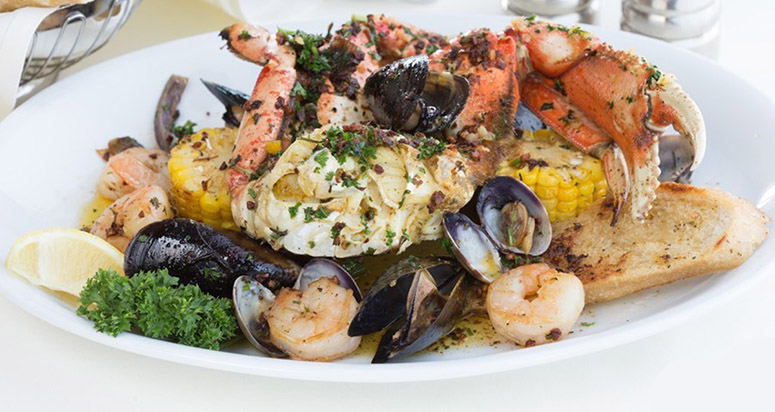San Francisco is a foodie's haven, boasting some of the best food in the country. From new and emerging trends to the freshest locally-grown cuisines, we've got it all. Within the course of a decade there has been a growing movement for sustainable dining, with farm-to-table dinners popping up on menus throughout the Bay Area.

Sustainable seafood helps manage our seafood resources to be enjoyed in the future. Photo courtesy of Fog Harbor Fish House
By Mallory Johnson
Published: May, 2016
San Francisco is a foodie’s haven, boasting some of the best food in the country. From new and emerging trends to the freshest locally-grown cuisines, we’ve got it all. Within the course of a decade there has been a growing movement for sustainable dining, with farm-to-table dinners popping up on menus throughout the Bay Area. But what about our seafood?
The concept of sustainable seafood has been around over the last 20 years or so, but it hasn’t quite risen in popularity in the same way as farm-to-table dining. Realizing the impact of some of our seafood eating habits can be difficult because we can’t directly witness the effects of our actions on the ocean in the same way that we see them on land. For many of us, the ocean is a mystery in all its vastness. The fact is, however, that it is a fragile ecosystem and can only support a limited amount of resources being taken from it.
What is sustainable seafood?
Sustainable seafood is seafood that is caught or farmed in ways that can maintain or increase the long-term population of a species, while also preserving the well-being of ocean ecosystems. Sustainable seafood helps manage our seafood resources to be enjoyed in the future.
There are a number of factors to consider when thinking about sustainable seafood, from fish population health and the type of fishing gear used on wild-caught seafood to habitat impacts and chemical usage on farmed seafood—just to name a few. Overfishing has one of the biggest impacts on the health of the ocean. Other key threats to fish populations and ocean health are bycatch and habitat destruction.
Why should I care?
The health of the ocean has a huge impact on those of us on land, whether you live near the ocean or not. General wellness and nutrition, access to food for all economic levels, and viable economic development are just a few examples of how the state of the ocean affects us. Here in San Francisco, recreational and commercial fishing, aquaculture farms and businesses, and coastal tourism are all vital to our local economy. Choosing sustainable seafood—particularly from local or West Coast fishing and farming operations—helps support these industries. Our coastal economy, healthy fisheries and the ecological wealth of the San Francisco Bay watershed are long-term beneficiaries of our sustainable choices.
What do you want me to do about it?
Choose sustainable seafood! The seafood decisions of consumers make an impact on the health of the ocean and the watershed. The good news is there are currently sustainable fisheries and aquaculture operations in many places throughout the world. Our consumption decisions make a difference in protecting the well-being of the watershed and the ocean. By using your consumer power and voting with your dollars, you can influence fisheries and aquaculture toward sustainable options.
That’s a lot to keep up with…
Sure, there’s a lot to consider when deciding whether or not to order that crab cocktail. Luckily, other people have already done most of the work for you. There are a number of handy resources that you can use to help you make sustainable decisions. Chances are you’ve heard of Monterey Bay Aquarium’s Seafood Watch program. The program now has a helpful free app that you can download on your smartphone that will tell you whether that tilapia you’re about to order is a best choice, or one to avoid. (Plus, it will even tell you why!)
Still too much work for you? Take all the effort out of it, and visit one of many restaurants around the Bay Area that have partnered with the San Francisco Bay Area Sustainable Seafood Alliance and are formally committed to serving only sustainable seafood. By dining at one of these restaurants, you can rest assured that no matter what you order, it’s good for the health of the ocean. For a list of sustainable Seafood Alliance restaurants, visit www.aquariumofthebay.org/seafoodie.
Mallory Johnson is the Communications Manager at Aquarium of the Bay, a nonprofit dedicated to protecting, restoring and inspiring the conservation of San Francisco Bay and its watershed.

